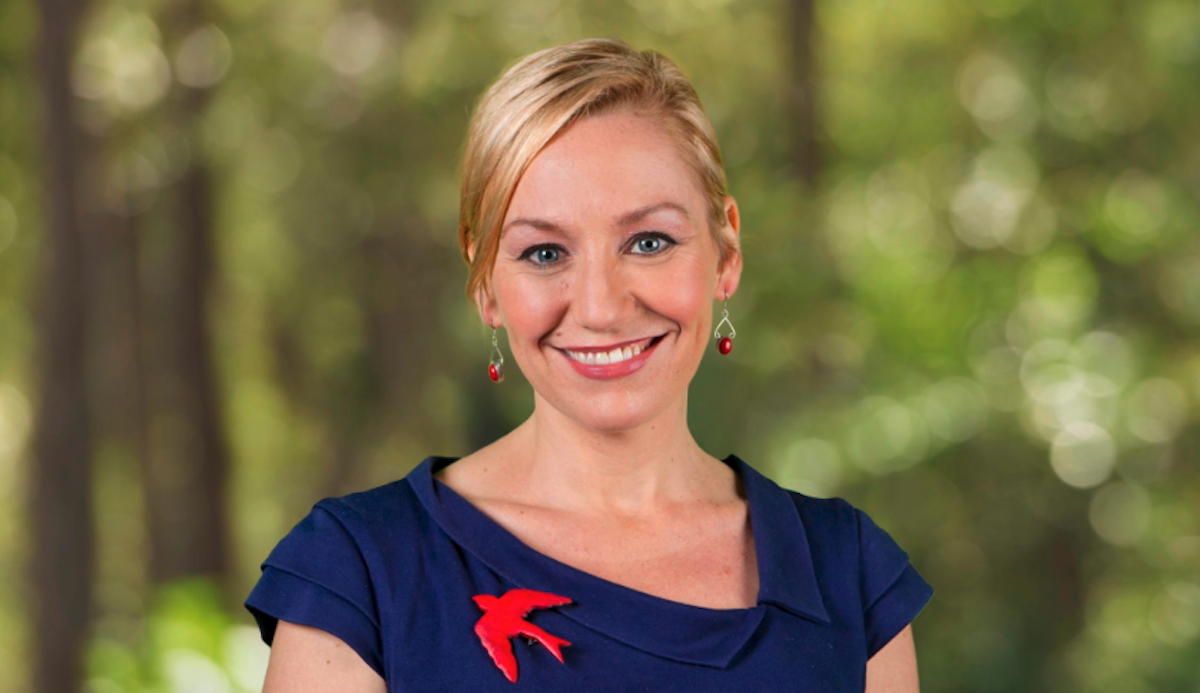

Queensland Senator Larissa Waters has just taken over from Adam Bandt as leader of the Australian Greens. Here’s what you need to know about her, and what she faces in the next Parliament.
Waters - a long-serving Green in the Senate - inherits her position as leader from exiting MP Adam Bandt. Bandt faced a tough election in his seat of Melbourne in the last election. Ultimately, however, after days of counting votes and biting nails, Bandt conceded.
Waters is now the new face of the party, with Senator Mehreen Faruqi as deputy. It was expected to be a three-way battle between fellow Senators Faruqi and Sarah Hanson-Young. A source told the ABC it was decided by ‘consensus’ as Waters ran unopposed in the ballot.
Already a familiar face to Senate watchers, Waters’ promotion to party leader marks a new chapter for a party that’s had to contend with a more hostile two-party system and fewer seats in Parliament.
Here’s what you need to know about the new boss of Australia’s third force in politics.
Waters was born in Winnipeg, Canada — more on that in a moment — but moved to Australia as an infant and grew up in Brisbane.
She studied environmental science and law at Griffith before working as a solicitor at the Environmental Defenders Office.
Her Queensland base gives the Greens a leadership foothold outside the traditional heartland of inner-Melbourne or Sydney.
Waters made her name in climate and environment law, but her portfolio work in Parliament has broadened over time.
She’s one of the Parliament’s most vocal advocates on big cornerstone Greens issues. That includes political integrity, lobbying transparency, fossil fuel donations, and gender justice.
Her speeches often link economic structures to environmental and social outcomes — making her a key voice in expanding the Greens’ appeal beyond climate.
In 2017, Waters temporarily resigned from the Senate after discovering she was technically a dual citizen. Remember all that Section 44 mess?
Waters was born in Canada to Australian parents who hadn’t renounced her foreign citizenship. This put her on the wrong side of the line when it came to her ability to serve in Parliament:
But after renouncing her Canadian ways in 2018, she returned to the Senate in 2018.
Good reminder here that if you ever want to run for politics, check your birth certificate first!
Back in 2017, Waters became the first woman to breastfeed in federal Parliament — a milestone moment that generated national headlines.
At the time, she made headlines, but she downplayed it as “just a working mum feeding her baby”.
She’s still pushing for more flexible workplace conditions and has called for better support for women in leadership.
Waters has led the Greens’ charge on banning political donations from fossil fuel companies and tightening rules on corporate lobbying.
She’s pushed for public funding of elections to reduce vested interests and has regularly called out Labor and the Coalition for what she accuses as “dirty donations” from coal, gas and oil interests.
Investors should expect continued scrutiny of corporate political influence under her leadership.
Waters’ vision for the Greens goes beyond emissions targets though.
She has championed superannuation reform, gender-responsive budgeting, and taxes on extreme wealth.
She’s argued for measuring wellbeing alongside GDP, and wants to tilt the economy toward services, care work, and sustainable industries.
It’s part of a broader attempt to define the economy as being for the underdogs rather than the billionaires.
When Labor sought to pass its housing Bill in 2023 and 2024, it ran into a Green roadblock fronted by Larissa Waters. In exchange for the minor party’s votes, Waters proposed the Bill be amended to include - among other things - a national freeze on rent hikes.
Former leader Adam Bandt’s shoes won’t be so easy to fill. The Greens face a range of new pressures on the next Parliament.
More Aussies voted Green than ever before in the 2025 election. But despite pocketing their highest national vote in history, it didn’t translate into a surge of seats for the still-minor party.
Green support base surged in safe Labor or Coalition seats. So despite a big swing against the two major parties, they weren’t able to flip them. This was compounded by preference flows and electoral re-districting prior to the election that put many hard-fought wins out of reach.
That’s the stage Larissa Waters takes to as leader. The Greens have good national momentum but fewer MPs and Senators to back it up. Positively, at least for Waters, the Greens still hold crucial votes on the Senate cross benches, including her own.
That’s not to mention the fact that both major parties have become more hostile to the Greens than ever:
Reelected Prime Minister Anthony Albanese accused the Greens on the campaign trail of making “the perfect the enemy of the good”. Other Labor MPs have accused the Greens as being obstructionists.
Reduced numbers hasn’t doused Waters’ political fire, though.
In her ascension statement, she made that very clear:
Waters added:
Voters have delivered the Greens the sole balance of power in the Senate, which gives us, and the country, more opportunity than ever before.
Labor cannot pass any legislation without either working with the Greens, or the Coalition - who we know would take us backwards.
Here’s what she’s voted for and against, according to vote-tracking site They Vote For You:
| Voted consistently For | Voted almost always For | Voted generally For | Voted for a mixture of For and Against | Voted generally Against | Voted almost always Against | Voted consistently against |
|---|---|---|---|---|---|---|
| A carbon price | Increasing freedom of political communication | Decreasing subsidisation of fossil fuels | Building Australia’s new submarine fleet in South Australia | Increasing funding for road infrastructure | The Coalition's new schools funding policy ("Gonski 2.0") | A character test for Australian visas |
| A federal inquiry into Queensland government administration | Increasing political transparency | Encouraging Australian-based industry | Letting all MPs or Senators speak in Parliament (procedural) | Reducing taxes for middle-income earners | A combined Federal Circuit and Family Court of Australia | |
| A minerals resource rent tax | Increasing transparency of the China-Australia relationship | Having a referendum on whether to create an Indigenous Voice to Parliament | Speeding things along in Parliament (procedural) | A declared area offence | ||
| A national redress scheme for institutional abuse survivors | Restricting donations to political parties | Increasing accessibility of government data and documents | Targeting foreign interference in Australia | A Free Trade Agreement with China | ||
| A publicly accessible foreign ownership register for agricultural land | Increasing consumer protections | A same-sex marriage plebiscite | ||||
| A Royal Commission into banking | Increasing or removing the Government debt limit | Adani's proposed Carmichael coal mine in the Galilee Basin | ||||
| A Royal Commission into Robodebt | Suspending the rules to allow a vote to happen (procedural) | An Australian Building and Construction Commission (ABCC) | ||||
| A Royal Commission into Violence and Abuse against People with Disability | Australia's timber industry | |||||
| A transition plan for coal workers | Banning mobiles and other devices in immigration detention | |||||
| An independent inquiry into Attorney-General Christian Porter | Charging postgraduate research students fees | |||||
| Assisting Australians trying to return from overseas | Climate change mitigation strategies (e.g., carbon capture and storage) | |||||
| Assisting the Arts sector through the coronavirus pandemic | Compulsory income management for welfare recipients | |||||
| Banning all investment in cluster munitions | Continuing Detention Orders (CDOs) | |||||
| Banning new thermal coal mines | Decreasing ABC and SBS funding | |||||
| Banning pay secrecy clauses | Decreasing availability of welfare payments | |||||
| Banning politicial deepfakes | Deregulating undergraduate university fees | |||||
| Building community climate change resilience | Extended Supervision Orders (ESOs) | |||||
| Building dedicated quarantine facilities (COVID-19) | Funding the national school chaplaincy program | |||||
| Capping gas prices | Giving apprentices access to a $20,000 loan | |||||
| Carbon farming | Giving approval for mining in the Liverpool Plains | |||||
| Closing the gap between Indigenous and non-Indigenous Australians | Imprisoning immigration detention workers who record or reveal information from their work | |||||
| Considering legislation to create a federal anti-corruption commission (procedural) | Increasing indexation of HECS-HELP debts | |||||
| Considering motions on Gaza (2023-24) (procedural) | Increasing investment in the coal industry | |||||
| Creating a federal Anti-Corruption Commission | Increasing scrutiny of unions | |||||
| Criminalising wage theft | Increasing surveillance powers |